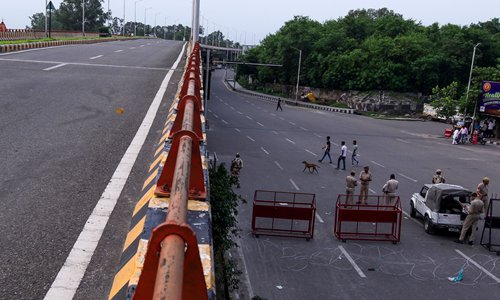HOME >> CHINA
China-India border talks yield positive result
By Deng Xiaoci Source:Global Times Published: 2019/12/22 16:48:40
Domestic unrest may have pressured Delhi into friendlier position: observer

Security personnel stand guard on a street in Jammu on August 6. Photo: VCG
China and India on Saturday renewed agreements on strengthening trust, and vowed to work out a framework for negotiations on a roadmap to a final solution on border issues, which observers hailed as a significant positive continuation of the recent informal summit of the leaders of the two countries.The agreements were reached during the latest annual meeting of special representatives from the two countries on Saturday in the Indian capital city of New Delhi, which was co-chaired by visiting Chinese special representative, State Councilor and Foreign Minister Wang Yi and Indian special representative and National Security Advisor Ajit Doval.
China and India should press forward talks on border issues in accordance with instructions made by the leaders of the two countries, and work out a framework for negotiation roadmap in a bid to reach a final solution which is fair, reasonable and accepted by both sides, Wang was quoted as saying by the Xinhua News Agency.
"Such an agreement on creating a framework for negotiations is of great political significance, marking a good continuation of the consensus achieved at the 2nd informal summit at Chennai in October 2019 by the leaders of China and India," Qian Feng, a research fellow at the national strategy institute of Tsinghua University in Beijing, told the Global Times on Sunday.
Qian noted that the two sides expressed willingness to meet each other halfway which provides hope for a final settlement.
Such positive outcomes would also help create a warmer atmosphere for the 70th anniversary of the establishment of diplomatic ties next year, Hu Zhiyong, a research fellow at the institute of international relations of the Shanghai Academy of Social Sciences told the Global Times.
The two sides exchanged views on boundary negotiations, reached consensus on strengthening trust, and agreed to make regulations on safeguarding peace in border areas, enhance communication and exchanges between each country's border troops and expand border trade and personnel exchanges, Xinhua reported.
According to a press release from the event by India's Ministry of External Affairs, "both sides agreed that it is important to maintain peace and tranquility in the border areas for the overall development of the bilateral relationship."
The special representatives shared the view that stable and balanced development of India-China relations is a positive factor for peace and prosperity in the region and the world.
However, Hu said he held reserved optimism toward the meeting's outcome, saying it was positive in general, but failed to yield a "practical guideline."
It is hard to rule out the possibility that Delhi is acting friendly as it focuses on more pressing current domestic unrest, considering India has had hardline attitude over the matter, Hu noted.
Indian media outlet The Economic Times in October reported that the South Asian country is ramping up its infrastructure by establishing more border outposts and has increased manpower and patrols along its border with China.
According to the report, 25 border outposts have been created for the Indo-Tibetan Border Police in the last five years and each outpost has a strength of about 100 troops, meaning there has been a deployment of 2,500 soldiers. And there are currently about 180 such outposts.
Improvements to roads in five Indian border states are expected to enable quicker mobilization of troops in the event of conflicts, according to a report in the Hong Kong-based South China Morning Post citing an Indian government document.
Maintaining peace and stability in border areas remains a major task for both sides even into the next decade, which demands that both sides strictly implement the consensus reached by the two leaders, and avoid incidents that could undermine bilateral ties, Hu said.
China in late October voiced strong dissatisfaction and firm opposition to the Indian government's announcement of implementation of the Jammu and Kashmir Reorganisation Act, which designated two so-called new "Union Territories" - Jammu and Kashmir, and Ladakh - under the direct rule of its central government after a proposal to its parliament to revoke the "special status" of India-controlled Kashmir, and split it into two Union territories on August 5.
"Jammu and Kashmir" is a disputed territory with Pakistan, while "Ladakh" is disputed with China and includes Chinese territories in its administrative division.
Posted in: DIPLOMACY